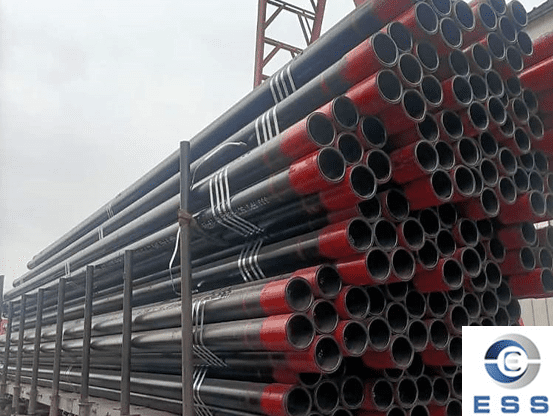
What Are The Applications of Well Casing Pipe?
Well casing pipe is a steel pipe structure
installed inside the wellbore and is widely used in oil production, groundwater
extraction, and geological exploration. Its primary functions are to support
the wellbore wall, isolate the formation, prevent fluid cross-linking, and
provide a channel for various downhole operations. Proper use of well casing
pipe can significantly improve well safety, stability, and operational
efficiency. So, what are its main applications?
Well casing pipe in oil production
In the oil and gas industry, well casing
pipe is a core component of oil country tubular goods (OCTG) and is
typically manufactured in accordance with API Spec 5CT.
Its application value is reflected in the following aspects:
1. Oil well protection and support
During oil production, oil well casing pipe
is a key component for protecting the wellbore wall.
Once the drill bit reaches a certain depth,
well casing pipe is lowered into the wellbore to prevent wellbore collapse.
During oil production, wellbore collapse can occur due to various factors, such
as formation pressure, rock properties, and drilling fluid erosion.
In some oil wells located in soft or
fractured formations, well casing pipe provides essential support to maintain
wellbore stability and ensure smooth subsequent production operations.
2. Isolating different formations
The geological conditions and fluid
properties of different formations vary significantly, and oil production often
traverses multiple formations (such as aquifers, oil layers, and gas layers).
Casing pipe's isolation function can:
Prevent fluid cross-contamination between
formations, preventing water intrusion into oil layers or gas channeling;
Prevent oil and gas leakage into non-target
layers, improving production efficiency;
Facilitate stratified water injection and
oil recovery, achieving refined reservoir management.
3. Guiding drilling tools and equipment
Well casing pipe provides guidance for the
lowering and extraction of drilling tools (such as drill pipe and logging instruments), allowing them to safely operate along a predetermined
path within the well.
This guidance function is particularly
important in deep wells or wells located in complex formations. It reduces
collision and friction between tools and the wellbore wall, extending tool life
and improving the accuracy of drilling and logging operations.
Well casing pipe in groundwater extraction
Well casing pipe is not only used in the
oil and gas industry but is also indispensable in groundwater projects
(drinking water wells, agricultural irrigation wells, geothermal wells, etc.).
1. Preventing well collapse and
contamination
For groundwater wells, water well casing pipe
prevents soil particles from surrounding the well wall from falling into the
well, thus preventing well wall collapse.
It also acts as a barrier, preventing
surface pollutants (such as sewage and pesticides) from seeping into the
groundwater, thereby protecting groundwater quality.
For example, in rural drinking water wells,
well casing pipe ensures that the extracted groundwater is clean and
contaminant-free, thus ensuring the safety of drinking water for residents.
2. Improving water extraction efficiency
and quality
Appropriate water well casing pipe can optimize
the groundwater inflow path, ensuring smoother groundwater flow into the well.
By rationally designing parameters such as
the well casing pipe diameter, length, and pore structure, the contact area
between the groundwater and the casing pipe can be increased, improving water
extraction efficiency.
In addition, water well casing pipe prevents
large amounts of impurities such as silt from entering the well, thereby
improving water quality.
Well casing pipe in geological
exploration
Well casing pipe also plays a vital role in
mineral exploration and scientific drilling.
1. Maintaining borehole integrity
Casing pipe supports the borehole,
preventing deformation and collapse of the wellbore wall due to formation
fracture or high-pressure infiltration;
It also ensures the integrity of core
collection, providing accurate data for stratigraphic correlation and mineral
evaluation.
2. Assisting geological testing and monitoring
Well casing pipe facilitates the
installation of various geological testing instruments (such as pressure
sensors and temperature sensors).
These instruments can be lowered into the
wellbore through the casing pipe to monitor formation pressure, temperature,
fluid properties, and other characteristics in real time, helping geologists
better understand the underground geological structure and resource
distribution.
Materials and standards for well casing
pipe in different fields
|
Application
|
Common Materials
|
Standards/Specifications
|
|
Petroleum Extraction
|
Carbon Steel Casing pipe (API Grades such
as J55,
K55, N80,
L80, and P110)
|
API Spec 5CT, ISO 11960, and API RP 65
|
|
Groundwater Extraction
|
Carbon Steel, Stainless Steel, PVC, and
Fiberglass
|
ASTM F480, ISO 14686, and local
groundwater well construction specifications
|
|
Geological Exploration
|
Carbon Steel, Stainless Steel, and PVC
|
Pipe ASTM D5783 and national/local
geological exploration specifications
|
Summary
Well casing pipe plays a crucial role in
oil extraction, groundwater utilization, and geological exploration. It plays
an irreplaceable role in wellbore stability and safety: it is the
"skeleton" of wellbore stability and safety; it is the key to
controlling formation fluids and ensuring recovery rate; and it is also an
important tool for scientific exploration and environmental protection.
Read more: Water Well Casing Pipe Specifications













 Eastern Steel Manufacturing Co.,Ltd not only improve product production and sales services, but also provide additional value-added services. As long as you need, we can complete your specific needs together.
Eastern Steel Manufacturing Co.,Ltd not only improve product production and sales services, but also provide additional value-added services. As long as you need, we can complete your specific needs together.










